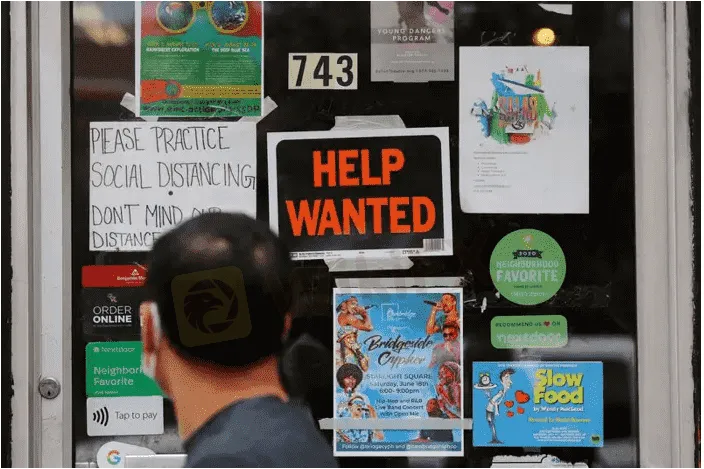简体中文
繁體中文
English
Pусский
日本語
ภาษาไทย
Tiếng Việt
Bahasa Indonesia
Español
हिन्दी
Filippiiniläinen
Français
Deutsch
Português
Türkçe
한국어
العربية
Japan’s wage growth to lag inflation over next 12 months
Abstract:Japanese wages are unlikely to grow as much as nationwide consumer prices over the coming year, almost 80% of economists said in a Reuters poll, which would be bad news for an economy that has hardly seen any real wage growth for more than two decades.

In a sign of further gloom, the worlds third-largest economy will likely expand at a much weaker pace than previously thought this quarter, the poll showed, as it braces for fallout from a slowdown in the United States, China and Europe.
The prospect that nominal wage growth will lag price increases raises the risk that households could tighten their purse strings, further hurting the economy.
“Its certain that price growth will be greater (than that of wages) over the coming 12 months,” said Hiroshi Namioka, chief strategist and fund manager at T&D Asset Management.
“While wages are rising, its hard to expect them to increase more than CPI.”
Japans average wages have hardly risen since the early 1990s and were the lowest among Group of Seven (G7) economies last year, according to OECD data.
That is despite some signs wages are picking up as a rapidly ageing population aggravates labour shortages, and labour unions could step up demands for increasingly big pay rises next year.
Japans nominal wages were highly unlikely to outgrow the overall year-on-year inflation rate over the coming 12 months, nine of 26 economists said.
Of the remaining 17 economists, another 11 said it was unlikely that nominal wages would outpace inflation over the same period. While six other economists expected consumer prices to increase faster than wages over the next year, none selected “highly likely”.
The nationwide overall inflation rate last stood at a near eight-year high of 2.6% in July, and has stayed above 2% for four consecutive months through July, buoyed by rises in the price of fuel and raw materials globally.
Whether bigger wage rises will catch on as a wider trend will ultimately hinge on what tack the countrys numerous small and mid-sized firms take, said Takumi Tsunoda, senior economist at Shinkin Central Bank Research Institute.
“The wage-raising momentum suffers from the sharp increases in raw material prices and so on,” he said.
Lower growth
Analysts slashed their estimates for economic growth on expectations of a gloomier global outlook.
Japans economy was now projected to expand an annualised 2.0% in the three months through September, the median forecast of 38 economists in the Aug. 15-24 poll showed, lower than 3.1% estimated in a July survey.
One economist estimated growth would grind to a halt this quarter.
Heightened fears of a global slowdown, driven in part by ramifications in Europe of Russia‘s war in Ukraine, are causing analysts to become more downbeat about the outlook for Japan’s economy as well.
The economy grew an annualised 2.2% in April-June, the government said this month, coming in below median market forecasts for a 2.5% gain.
Economists in the poll slightly upgraded their forecast for the final quarter of the year, predicting the economy to expand another 2.2% on an annualised basis versus 2.0% growth expected in last months poll.
The poll also found core consumer prices, which exclude volatile fresh food prices, would rise 2.3% this fiscal year through next March, and 1.1% in fiscal 2023.
The economy will grow 1.7% this fiscal year, followed by an estimated 1.3% growth in fiscal 2023, the poll showed, both down from higher forecasts in July.

Disclaimer:
The views in this article only represent the author's personal views, and do not constitute investment advice on this platform. This platform does not guarantee the accuracy, completeness and timeliness of the information in the article, and will not be liable for any loss caused by the use of or reliance on the information in the article.
Read more

Top Forex Brokers for Low-Cost Trading in 2025
Find the best Forex brokers for 2025 with low spreads, zero commissions, and no hidden fees. Simplify your trading journey with insights and the WikiFX app!

Participate Now in ForexCup Trading Championship
FXOpen announced the trading competition called ForexCup Trading Championship 2025 for traders. You can join, trade, and compete for exciting prizes. Here are the details

What the Movie Margin Call Taught Traders About Risk and Timing
The 2011 film Margin Call offers a gripping portrayal of the early hours of the 2008 financial crisis, set within a Wall Street investment firm. While the film is a fictionalised account, its lessons resonate strongly with traders and finance professionals. For one trader, watching the film had a lasting impact, shaping how they approached risk, decision-making, and the harsh realities of the financial world.

Why More Traders Are Turning to Proprietary Firms for Success
Over the past decade, one particular avenue has gained significant popularity: proprietary trading, or prop trading. As more traders seek to maximize their earning potential while managing risk, many are turning to proprietary firms for the resources, capital, and opportunities they offer. In this article, we’ll explore why an increasing number of traders are choosing proprietary trading firms as their preferred platform for success.
WikiFX Broker
Latest News
Fake ‘cyber fraud online complaint’ website Exposed!
Day Trading Guide: Key Considerations
NAGA Launches CryptoX: Zero Fees, 24/7 Crypto Trading
Scam Alert: 7 Brokers You Need to Avoid
AvaTrade Launches Advanced Automated Trading Tools AvaSocial and DupliTrade
What Determines Currency Prices?
Why More Traders Are Turning to Proprietary Firms for Success
MC Markets Review 2025
How to Use an Economic Calendar in Forex Trading
T4Trade Enhances Forex Trading with Advanced Tools for 2025
Currency Calculator






